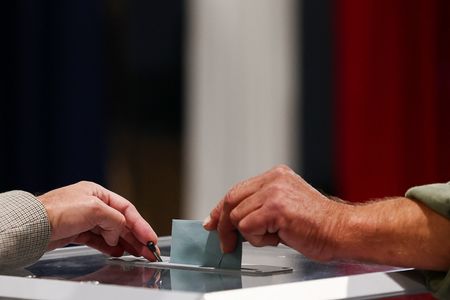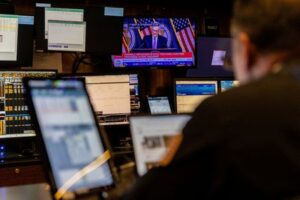By Yoruk Bahceli and Samuel Indyk
(Reuters) -Investors are sceptical that the relief rally after France’s first-round parliamentary election can last, wary that the outlook for the country’s creaking public finances will remain in focus with several political hurdles ahead.
The closely-watched spread French government bonds pay over Germany’s retreated from a 12-year high on Monday and bank shares surged as Marine Le Pen’s National Rally (RN) scored a win smaller than some polls had expected on Sunday.
The results lessen the chance of an absolute majority for the RN, or a win for the left-wing alliance that came second, and were a relief for markets rattled since the surprise election was called last month.
But investors remained cautious with uncertainty high ahead of a second-round vote on July 7 and beyond, seeing little scope for improvement in France’s weak fiscal position as both the far-right and left have pledged big spending increases.
“It would be too premature to say the battle is over,” said Nicolas Forest, CIO at asset manager Candriam.
“We are at the beginning of a new political era in France and the situation will stay very uncertain and very complicated.”
Even after Monday’s bounce, French assets have barely recovered. France’s 10-year yield rose to its highest since November on Monday. The French/German bond spread is still over 25 basis points wider than before President Emmanuel Macron called the election on June 9 and not expected to recover any time soon. Shares in France’s three biggest lenders are still down 7-12%%.
Underweight French debt, Forest saw scope for the French-German spread to widen to 100 bps even with a hung parliament, where no one party has an outright majority.
The first hurdle is Sunday’s second round election.
Leaders of the left-wing alliance and Macron’s centrist grouping have indicated they would withdraw their own candidates in districts where another candidate was better placed to beat the RN.
But it was unclear if the pact would always apply if the left-wing candidates were from Jean-Luc Melenchon’s far-left France Unbowed party.
Candidates through to the run-off have until Tuesday to decide whether to run or stand down. High turnout on Sunday means France is heading for a record number of three-way run-offs, which are expected to benefit the RN.
“Anything that would increase support for the far-right parties would be the biggest risk from here,” said Colin Finlayson, co-manager of the Aegon Strategic Bond Fund.
TURMOIL AHEAD
An uncertain political environment adds to worries about the long-term challenges for France’s stretched finances that saw its credit rating downgraded in May.
With a budget deficit rising to 5.5% of output last year, far higher than European Union rules permit, France faces disciplinary measures from the EU executive.
Given big spending pledges from the RN as well as the left-wing alliance, “it’s difficult to see how you’re going to get much through parliament that says reduce spending,” said David Zahn, head of European fixed income at Franklin Templeton, who remains underweight French debt.
“This is a sea change for France, (the spread) will now have to trade wider because of its fiscal dynamics, its political dynamics.”
The RN has toned down some of its more radical plans and said it would respect the EU’s fiscal rules, but it’s unclear how much of its plans are funded.
Investors were considering scenarios including ones where legislation is passed on a bill-by-bill basis or Macron tries building a broad majority that would still face instability.
RN leader Jordan Bardella has said he only wants to be Prime Minister if it won an absolute majority.
“If no one gets an absolute majority, you always end up in a situation where you have a government which will have to cobble up together all the time, very complex arrangements across political families which don’t have a habit of working together,” said AXA’s chief economist Gilles Moec.
That raises the risk of another election after 12 months, when they are permitted again, investors said, meaning uncertainty persisting.
“It will be really uncharted territory for France,” said Candriam’s Forest. “It will stay unstable, this government cannot stay for more than one year.”
(Reporting by Yoruk Bahceli and Samuel Indyk; editing by Dhara Ranasinghe and David Evans)





